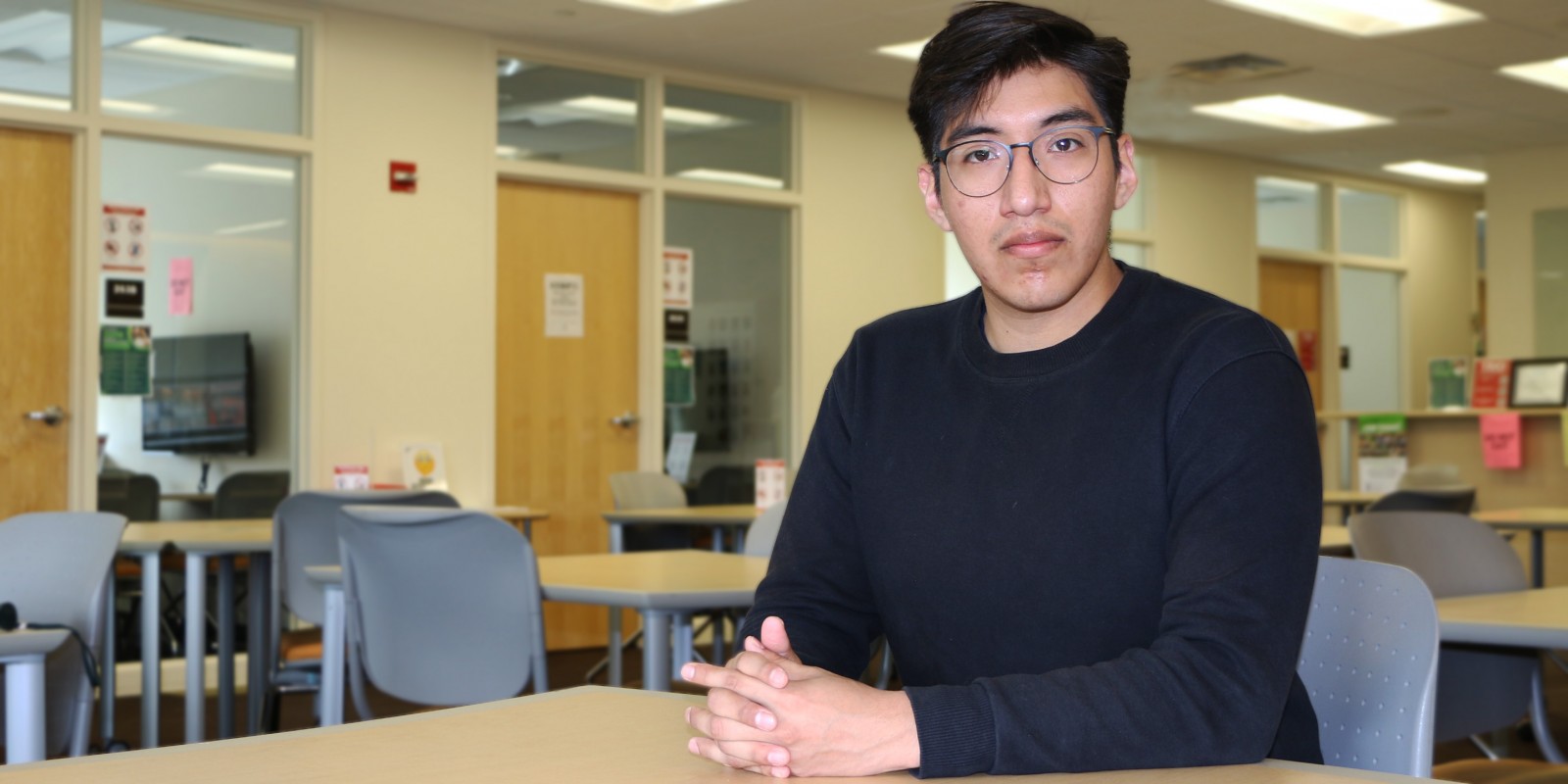First-gen student discovers passion for research through EOP
Psychology major Alberto Torres presented research on sexual violence in Boston and Belgium

Alberto Torres, a junior psychology major, returned to Binghamton last month after a whirlwind couple of weeks presenting his research on sexual violence at conferences in Boston and Belgium.
Torres’s parents immigrated to the U.S. from Mexico in their early 20s and didn’t have the opportunity to attend college. Torres, therefore, was determined to make the most of his collegiate experience. He started at the University of Albany, but transferred to Binghamton at the beginning of his sophomore year.
“My plan was always to transfer here,” Torres said. “Binghamton has a reputation for being one of the most challenging SUNY schools.”
At Binghamton, Torres found his place after a few detours and with the help of peer mentors to guide him. He initially pursued a degree in neuroscience, but soon found that it wasn’t for him — the required math classes in particular — so he changed his major to chemistry. Still, something wasn’t right.
“I felt very out of place in chemistry,” Torres said. “So I turned back to psychology, because that’s the part of neuroscience I enjoyed the most.”
As he adjusted to classes at Binghamton, Torres made use of the tutoring services offered at the Educational Opportunity Program (EOP) Tutorial Center, where he met Shermont Bradwell ’21, a peer tutor.
“I met Shermont my first semester here. They guided me and helped me find my way,” Torres said. “I’m very grateful that I met them.”
Bradwell, as it turned out, guided Torres through more than just classes and a social life. They also opened the door to undergraduate research experiences, which solidified Torres’s love of psychology.
During his second semester at Binghamton, Torres attended a mixer for EOP students hosted by the Undergraduate Research Center, where he met Matthew Johnson, a professor and the director of clinical training in the Psychology Department.
“Shermont was initially the one who pushed me to find research opportunities and speak with my professors, which is what led to me to introduce myself to [Johnson],” Torres said.
Johnson then introduced Torres to graduate student Quinn Hendershot and, eventually, invited him to join the Marriage Lab, run by Johnson in collaboration with Associate Professor of Psychology Richard Mattson. The lab studies intimate relationships, and it’s current primary focus is on sexual violence assessment and prevention.
Much as Bradwell provided early guidance for Torres, Hendershot was instrumental in helping him find his place in research.
“Quinn has mentored me throughout my time in the lab,” Torres said. “I do a lot of work and research with her, and she helps me out with whatever I need.”
In early March, Torres presented in Boston at the Eastern Psychological Association Conference. That research focused on intimate partner violence, examining the efficacy of measures addressing intimate partner violence when messages for Spanish speakers were translated from English versus those that were originally developed in Spanish.
Just over a week later, Torres traveled to Belgium with Michael Shaw, a graduate student in the Marriage and Family Studies Lab, to present at the Association for Psychological Science’s International Convention of Psychological Sciences. Their poster, “The Message Matters: Sexual Assault Intervention Content Interacts with Hostile Masculinity and Impersonal Sex Orientation,” focused on workplace sexual violence.
“I looked at what it is about sexual harassment trainings that makes high-risk men more likely to sexually assault women after being exposed to these trainings,” Torres explained. “The poster drew a lot of interest, mainly from women. They said that what we’re doing is very important.”
The turnaround between Boston and Belgium was tight, but Torres is passionate about his research and enjoys staying busy. His research experiences also provide a sense of belonging in psychology and at the University.
“Now that I’ve come to Binghamton, I have more direction because of the professors I’ve met and kept in contact with, as well as the graduate students in the research lab,” he said.
Torres’s goal is to obtain a PhD in clinical psychology and go on to be a psychologist and professor.
“I’d like to end up at a university where I can do research, teach classes and provide therapy,” he said.
Despite his hectic class and research schedule, Torres manages to find balance through other activities. He volunteered as a tutor for high school students for a semester through the Center for Civic Engagement, and spent a semester as a teacher’s aid for a second-grade class at Benjamin Franklin Elementary School in Binghamton. Last semester, he volunteered at GiGi’s Playhouse, a Down syndrome achievement center, as a literacy tutor.
“That was fun,” Torres said. “I had to make lesson plans and go about executing them. We worked on how to write the letter ‘D.’”
He’s also a peer advisor in the Psychology Department, where he enjoys the opportunity to talk to a wide range of students on campus.
Still, the research lab is where he finds himself logging most of his hours, a time commitment that’s sure to increase next semester with his promotion to lab manager.
“I want to make the lab a place where everyone feels wanted and welcome,” he said.
The lab is the most important part of Torres’s undergraduate experience, and it’s something he may never have immersed himself in if not for EOP and the networking opportunities provided by the program. Without Bradwell and Hendershot, he may never have discovered his love for research, which has clearly changed his life, leading him to exciting opportunities, important presentations and a line of unopened doors, each one just waiting to be opened.

